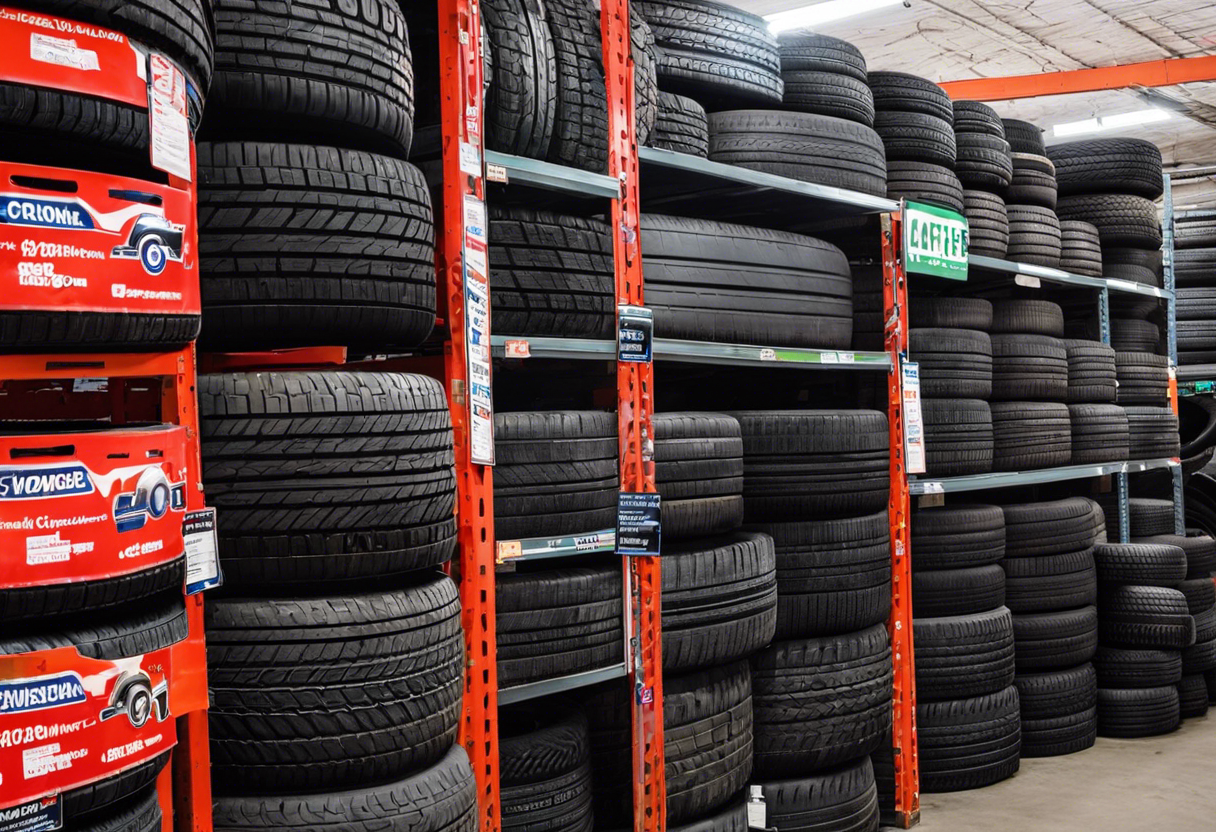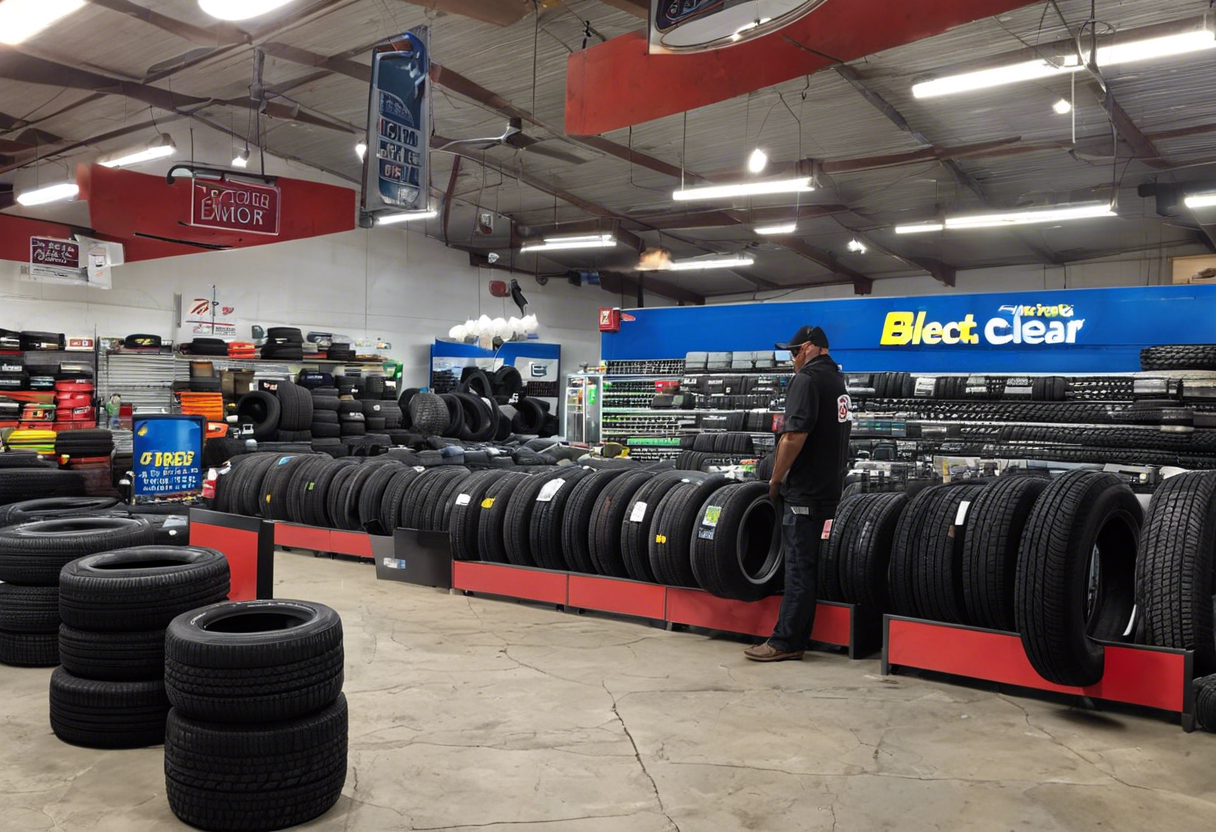When considering purchasing used tires, there are essential factors to keep in mind to ensure you make a wise and budget-friendly decision. Understanding the benefits and potential drawbacks of buying second-hand tires will help you navigate this cost-effective alternative effectively.
- Cost-Effective Solution: Buying used tire can provide significant savings compared to purchasing brand new tires. This option is particularly attractive for individuals looking to replace tires on a budget without compromising on safety.
- Quality Assessment: Before buying used tire, it is crucial to assess their quality carefully. Inspect for tread depth, signs of damage, age of the tire, and any visible wear and tear. Choosing tires in good condition will ensure durability and performance.
- Reliable Sellers: To secure high-quality used tire, it is advisable to source them from reputable sellers. Establishments such as tire shops, auto repair shops, and online marketplaces often offer reliable options with varying price points to suit your budget.
- Proper Installation: Once you have purchased used tire, it is essential to have them installed correctly by a professional. Proper installation ensures optimal performance and safety while driving.
- Budget Considerations: While used tire offer cost savings, it is essential to consider the overall value they provide. Evaluate the price, quality, and remaining lifespan of the tires to make an informed decision that aligns with your budget and needs.
Understanding the nuances of buying them will equip you with the knowledge needed to make a confident purchase that meets both your financial constraints and quality expectations. By exploring reliable sources and conducting thorough inspections, you can find viable used tire options that offer a balance of affordability and performance.
Benefits of Buying Used Tires
- Cost-Effective: They are a budget-friendly option, typically priced at a fraction of the cost of new tires. This can result in significant savings, especially for those on a tight budget or looking to replace multiple tires at once.
- Environmental Impact: Opting for used tire helps reduce waste by giving these tires a second life instead of adding to landfill waste. By reusing tires, you are contributing to a more sustainable and eco-friendly approach to tire disposal.
- Quality Options: Many used tire retailers offer a wide selection of high-quality, gently used tire. These tires often come from vehicles that were well-maintained and have plenty of tread remaining, providing reliable and safe options for your vehicle.
- Brand Variety: When buying used tire, you may have access to a wider range of brands and tire models that might be out of your price range if purchased new. This allows you to choose from different brands and tread patterns to find the best fit for your vehicle and driving needs.
- Immediate Availability: They are usually readily available, making them a convenient option for those in urgent need of tire replacement. This can be especially beneficial in emergency situations or when a sudden tire issue arises.
- Potential Warranty: Some used tire retailers offer warranties or guarantees on their products. While these warranties may vary, they can provide added peace of mind knowing that you are protected in case of any unforeseen issues with the used tire.
Factors to Consider When Buying Used Tires
- Tread Depth: Ensure the tires have a sufficient tread depth to provide traction and safety on the road.
- Age of the Tires: Check the manufacturing date to ensure the tires are not too old, as older tires can degrade and be unsafe.
- Tire Brand and Quality: Consider reputable brands known for durability and performance.
- Tire Size: Make sure the used tire match the size specifications recommended for your vehicle.
- Tire Condition: Inspect the tires for any signs of damage, such as cuts, bulges, or punctures.
- Tire History: Ask about the tire’s history, including whether it has been repaired, patched, or involved in an accident.
- Price: Compare prices from different sellers to ensure you are getting a good deal without compromising on quality.
- Return Policy: Check if there is a return policy in case the tires are not suitable for your vehicle.
- Installation: Factor in the cost of installation when budgeting for used tire. Some sellers may offer installation services for an additional fee.
- Certifications: Look for sellers who provide certifications or guarantees for the quality and safety of their used tire.
Where to Find Used Tires Online
When looking for budget-friendly used tire online, there are several reputable websites to consider. Here are some top options:
- eBay: eBay offers a wide selection of new and used tire from various sellers. You can filter your search by brand, size, and condition to find the best deal.
- Tire Rack: Tire Rack not only sells new tires but also has a selection of high-quality, inspected, and approved used tire. They offer detailed information about each tire’s condition and tread depth.
- Amazon: Amazon is a convenient option for purchasing used tire online. You can read reviews from other buyers to help guide your decision and choose from a range of brands and sizes.
- Craigslist: Craigslist is a popular platform for buying and selling used goods, including tires. You can find local sellers and negotiate prices directly with them.
- Facebook Marketplace: Similar to Craigslist, Facebook Marketplace allows you to search for used tire in your local area. It’s a simple way to connect with sellers and potentially find great deals.
- TireBuyer: TireBuyer offers a selection of new and used tire, allowing you to save money while still getting quality products. They deliver directly to your home or a local installer.
- Local Tire Shops’ Websites: Many local tire shops also sell them on their websites. Check with shops in your area to see if they offer this option and browse their inventory online.
By exploring these online options for used tire, you can compare prices, read reviews, and find the best deals without leaving the comfort of your home.
Local Options for Buying Used Tires
When looking for budget-friendly used tire, it’s advantageous to explore local options that may offer cost-effective solutions. Here are some recommendations for finding them near you:
- Local Tire Shops: Visiting local tire shops can be a fruitful option. Many shops receive used tire from customers who have recently purchased new ones. They often inspect these tires for quality and sell them at a lower price than new ones. Check with shops in your area to see if they have a selection of used tire available.
- Auto Repair Shops: Auto repair shops may also have used tire in stock. When customers replace tires as part of a repair job, these shops might keep the old but still usable tires. Contact local auto repair shops to inquire about their inventory of used tire.
- Online Classifieds: Websites like Craigslist and Facebook Marketplace can be valuable resources for finding used tire from individuals in your area. These platforms often have listings for people selling their old tires at discounted prices. Be sure to inspect the tires in person before making a purchase to ensure they meet your standards.
- Tire Recycling Centers: Some tire recycling centers collect old tires that are still in good condition. These centers may sell these tires at affordable prices as a way to promote recycling and reuse. Reach out to tire recycling centers near you to inquire about purchasing used tires.
By exploring these local options, you can potentially find quality used tire at a fraction of the cost of new ones. Be sure to inspect the tires carefully for signs of wear and damage before making a purchase to ensure your safety on the road.
Things to Look Out for When Buying Used Tires
- Tread Wear: Check the tread depth and overall condition of the tires. Make sure the tread is even and not overly worn down. Uneven wear may indicate alignment issues.
- Age of the Tires: Look for the manufacturing date on the tire sidewall. Avoid tires that are over six years old, as rubber can degrade over time, impacting performance and safety.
- Tire Damage: Inspect tires for cuts, bulges, or cracks in the sidewall. These can weaken the tire structure and pose a safety hazard on the road.
- Tire Pressure: Ensure that the used tire have proper inflation. Low tire pressure can affect handling and fuel efficiency, while overinflated tires can be prone to blowouts.
- Brand and Model: Consider sticking to reputable brands and matching tire models for uniformity in performance and handling characteristics.
- Tire History: If possible, find out the tire’s history, including any major incidents it may have been involved in. This information can indicate potential hidden damage.
- Legal Compliance: Check if the used tires meet legal requirements in terms of tread depth and overall condition. Using tires that do not comply with regulations can result in fines or accidents.
- Seller Reputation: Purchase from reliable sources with a good reputation for selling quality used tire. Avoid deals that seem too good to be true, as they may compromise safety.
By keeping these factors in mind when buying used tire, consumers can make informed decisions to ensure both budget-friendliness and safety on the road.
Tips for Maintaining Used Tires
- Proper Inflation: Regularly check and maintain the proper tire pressure to ensure even wear and optimal performance. Underinflated tires can decrease fuel efficiency and increase the risk of blowouts.
- Rotate Tires: Rotate your tires every 6,000 to 8,000 miles to promote even wear. This helps extend the lifespan of your used tire and ensures better traction on the road.
- Balancing: Ensure your tires are balanced when they are mounted on the rims. Unbalanced tires can lead to uneven wear patterns and cause vibrations while driving.
- Alignment: Get your wheels properly aligned to prevent uneven wear on your tires. Misaligned wheels can cause your tires to wear out faster and affect your vehicle’s handling.
- Regular Inspections: Inspect your tires regularly for any signs of damage, such as cuts, punctures, or bulges. Addressing these issues promptly can prevent more significant problems in the future.
- Avoid Overloading: Avoid overloading your vehicle beyond its weight capacity. Excess weight can put extra strain on your tires, leading to premature wear and potential safety hazards.
- Driving Habits: Be mindful of your driving habits. Avoid sudden stops, sharp turns, and aggressive driving, as these can wear out your tires faster.
- Storage: If you have spare tires, store them properly in a cool, dry place away from sunlight and extreme temperatures. This helps preserve the quality of the tires for future use.
By following these maintenance tips, you can ensure that your used tire provide safe and reliable performance while saving money on your vehicle expenses.
Conclusion
- Consider all of your options when looking to purchase them.
- Research prices and customer reviews before making a final decision.
- Remember to inspect the tires for quality and safety before purchase.
- Buying from reputable sources can ensure better quality and reliability.
- Check for any warranties or guarantees that may come with the them.
- Proper maintenance and care can help extend the life of your them.
FAQs
Read More: When considering purchasing used tire, there are essential factors to keep in mind
Read More: Top Tips for Finding the Best Wheel Repair Near You

